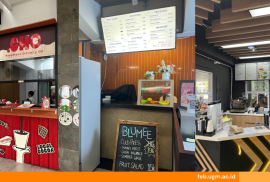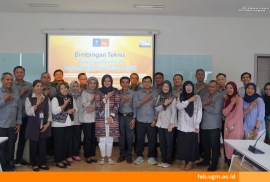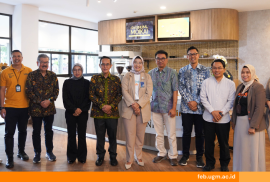On Tuesday (14/11), the Faculty of Economics and Business, Universitas Gadjah Mada (FEB UGM) organized a workshop titled “Elevating Integrity in Research and Publication”. Held at Djarum Hall, Pertamina Tower 6th Floor, FEB UGM, the workshop emphasized the importance of ethics in conducting research. Widya Paramita, S.E., M.Sc., PhD, a lecturer in the Department of Management at FEB UGM, moderated the workshop.
First Session: The Connection between Ethics and Research
There were two sessions in this workshop. Dian Kartika Rahajeng, S.E., M.Sc., Ph.D., a lecturer in the Department of Accounting at FEB UGM conducted the first session. The discussion began with ethical issues commonly encountered in research, including concerns and consent issues, risk mitigation, the relationship between researchers and respondents, anonymity, and language barriers. When categorized, these issues broadly fall into three groups: ethics, honesty, and integrity.
Ethics can be defined as a discipline related to the moral standards of a society. Generally, ethics is divided into two types: descriptive ethics reflects what is morally considered proper by culture or society. In contrast, prescriptive ethics refers to actions taken by an individual based on applicable ethics.
Ethics in research is crucial for several reasons. Research can significantly impact society, meaning it has the power to influence the behavior of many people. This impact includes potential adverse effects on individuals, communities, and the environment. Therefore, ethics is essential to mitigate potential harm. Additionally, research is susceptible to various ethical violations, such as biased studies, privacy violations, missing content, forgery, and plagiarism.
To avoid ethical violations in research, several sequential steps can be taken. First, researchers must engage in planning, which involves planning the topic to be studied. This stage requires conceptualization of the study design, including risk identification and mitigation. Pilot testing of research instruments is also carried out at this stage.
The second stage is data collection, which requires a consent form to be approved by respondents. The consent form contains detailed explanations about the research to be conducted. The third and final stage of research is the writing process. In writing research results, emphasis should be placed on avoiding fraud, such as plagiarism, fabrication, falsification, cherry-picking, and others. Ultimately, five fundamental principles of research ethics can be drawn: honesty, transparency, accountability, respect, and rigor.
Second Session: Ethics in the Peer-Review Process
The second session was conducted by Dr.Eng. Ir. Sunu Wibirama, S.T., M.Eng., IPM., a Professor from the Department of Electrical Engineering and Informatics at UGM. This session specifically addressed ethics in the peer-review process. As a preliminary step, researchers need to understand their audience when submitting publications. The research topic must be original, informative, easy to read, convincing of its importance to readers, and supported by solid evidence. Only then can researchers proceed to the peer-review process.
After collecting research results, the editor can decide the article’s suitability. Editors can accept the article, accept it with minor revisions, accept it with significant revisions, decide on revisions and resubmission, or even reject it. In communicating with the editor, Dr. Sunu provided some tips for preparing a good cover letter. Make sure the editor’s name is written in full. Additionally, authors should introduce themselves.
Then, the authors can explain the content and interesting aspects of the submitted manuscript. Authors must also be convinced why their study is essential and can contribute to existing literature. Originality and target readers should also be mentioned in the cover letter. Additionally, the cover letter can be added with a letterhead at the top.
As part of the ethics in peer review, Dr. Sunu outlined the dos and don’ts in responding to research review results. In essence, researchers need to consider the deadline for revisions. Additionally, the review results need to be read carefully and thoroughly. Responses to the review results need to be articulated well and politely.
Furthermore, an excellent way to write a response paper was presented. First, researchers should explain revisions in sufficient detail. Second, the research should be supported by adequate literature. Third, arguments can be further strengthened with supporting data. Fourth, researchers can defend their ideas with existing literature evidence if there is a debate with the reviewer. The session concluded with a question and answer between the audience and the two speakers.
Reportage: Rizal Farizi
Watch the full video at https://youtu.be/mFZ5oHJjreg





